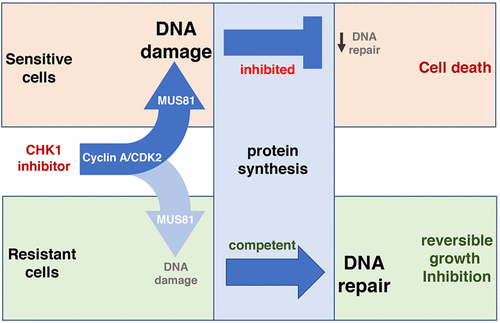当前位置:
X-MOL 学术
›
ACS Pharmacol. Transl. Sci.
›
论文详情
Our official English website, www.x-mol.net, welcomes your
feedback! (Note: you will need to create a separate account there.)
Inhibition of Protein Synthesis Induced by CHK1 Inhibitors Discriminates Sensitive from Resistant Cancer Cells
ACS Pharmacology & Translational Science ( IF 4.9 ) Pub Date : 2021-08-04 , DOI: 10.1021/acsptsci.1c00150 John W Hinds 1 , Jennifer P Ditano 1 , Alan Eastman 1
ACS Pharmacology & Translational Science ( IF 4.9 ) Pub Date : 2021-08-04 , DOI: 10.1021/acsptsci.1c00150 John W Hinds 1 , Jennifer P Ditano 1 , Alan Eastman 1
Affiliation

|
The DNA-damage-activated checkpoint protein CHK1 is required to prevent replication or mitosis in the presence of unrepaired DNA damage. Inhibitors of CHK1 (CHK1i) circumvent this checkpoint and enhance cell killing by DNA-damaging drugs. CHK1i also elicit single-agent cytotoxicity in a small subset of cell lines. Resolving the mechanisms underlying the single-agent activity may permit patient stratification and targeted therapy against sensitive tumors. Our recent comparison of three CHK1i demonstrated that they all inhibited protein synthesis only in sensitive cells. LY2606368, the most selective of these CHK1i, was used in the current study. Comparison across a panel of cell lines demonstrated that sensitive cells died upon incubation with LY2606368, whereas resistant cells underwent growth inhibition and/or cytostasis but failed to die. Sensitive cells exhibited inhibition of protein synthesis, elevated DNA damage, impaired DNA repair, and subsequently death. The consequence of CHK1 inhibition involved activation of cyclin A/CDK2 and MUS81, resulting in DNA damage. This damage led to activation of AMPK, dephosphorylation of 4E-BP1, and inhibition of protein synthesis. Inhibition of MUS81 prevented activation of AMPK, while inhibition of AMPK enhanced DNA repair and cell survival. The activation of AMPK may involve a combination of LKB1 and CaMKKβ. This study raises questions concerning the potential importance of the inhibition of protein synthesis in response to other drugs, alone or in combination with CHK1i. It also highlights the importance of clearly discriminating among growth inhibition, cytostasis, and cell death, as only the latter is likely to result in tumor regression.
中文翻译:

CHK1抑制剂诱导的蛋白质合成抑制区分敏感癌细胞和耐药癌细胞
在存在未修复的 DNA 损伤的情况下,DNA 损伤激活的检查点蛋白 CHK1 是防止复制或有丝分裂所必需的。CHK1 (CHK1i) 的抑制剂绕过这个检查点并通过破坏 DNA 的药物增强细胞杀伤力。CHK1i 还在一小部分细胞系中引发单剂细胞毒性。解决单药活性的潜在机制可能允许患者分层和针对敏感肿瘤的靶向治疗。我们最近对三种 CHK1i 的比较表明,它们都仅在敏感细胞中抑制蛋白质合成。LY2606368 是这些 CHK1i 中最具选择性的,用于当前研究。对一组细胞系的比较表明,敏感细胞在与 LY2606368 孵育后死亡,而抗性细胞经历了生长抑制和/或细胞抑制但未能死亡。敏感细胞表现出蛋白质合成的抑制、DNA 损伤升高、DNA 修复受损以及随后的死亡。CHK1 抑制的结果涉及激活 cyclin A/CDK2 和 MUS81,导致 DNA 损伤。这种损伤导致 AMPK 的激活、4E-BP1 的去磷酸化和蛋白质合成的抑制。MUS81 的抑制阻止了 AMPK 的激活,而 AMPK 的抑制增强了 DNA 修复和细胞存活。AMPK 的激活可能涉及 LKB1 和 CaMKKβ 的组合。这项研究提出了关于抑制蛋白质合成以响应其他药物(单独或与 CHK1i 组合)的潜在重要性的问题。它还强调了明确区分生长抑制、细胞抑制和细胞死亡的重要性,
更新日期:2021-08-13
中文翻译:

CHK1抑制剂诱导的蛋白质合成抑制区分敏感癌细胞和耐药癌细胞
在存在未修复的 DNA 损伤的情况下,DNA 损伤激活的检查点蛋白 CHK1 是防止复制或有丝分裂所必需的。CHK1 (CHK1i) 的抑制剂绕过这个检查点并通过破坏 DNA 的药物增强细胞杀伤力。CHK1i 还在一小部分细胞系中引发单剂细胞毒性。解决单药活性的潜在机制可能允许患者分层和针对敏感肿瘤的靶向治疗。我们最近对三种 CHK1i 的比较表明,它们都仅在敏感细胞中抑制蛋白质合成。LY2606368 是这些 CHK1i 中最具选择性的,用于当前研究。对一组细胞系的比较表明,敏感细胞在与 LY2606368 孵育后死亡,而抗性细胞经历了生长抑制和/或细胞抑制但未能死亡。敏感细胞表现出蛋白质合成的抑制、DNA 损伤升高、DNA 修复受损以及随后的死亡。CHK1 抑制的结果涉及激活 cyclin A/CDK2 和 MUS81,导致 DNA 损伤。这种损伤导致 AMPK 的激活、4E-BP1 的去磷酸化和蛋白质合成的抑制。MUS81 的抑制阻止了 AMPK 的激活,而 AMPK 的抑制增强了 DNA 修复和细胞存活。AMPK 的激活可能涉及 LKB1 和 CaMKKβ 的组合。这项研究提出了关于抑制蛋白质合成以响应其他药物(单独或与 CHK1i 组合)的潜在重要性的问题。它还强调了明确区分生长抑制、细胞抑制和细胞死亡的重要性,











































 京公网安备 11010802027423号
京公网安备 11010802027423号